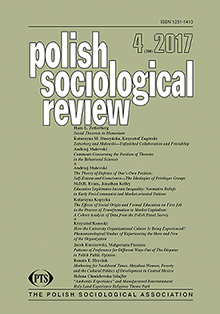Comments Concerning the Position of Theories in the Behavioral Sciences
Comments Concerning the Position of Theories in the Behavioral Sciences
Author(s): Andrzej MalewskiSubject(s): Social Theory
Published by: Polskie Towarzystwo Socjologiczne
Keywords: behavioral sciences
Summary/Abstract: In this article, I tried (1) to distinguish between various meanings given to the word “theory” in the contemporary social sciences; (2) to present examples of three types of theories conceived as systems of strictly general propositions; and (3) to point out some problems suggested by the analysis of existing theories which seem to be relevant to the codification of theoretical knowledge in the social sciences. An attempt was made toward clarification of three main meanings of the term “theory.” In the first meaning the term “theory” designates speculations that have not been empirically tested and that often are not testable. In the second meaning the term is used to refer to every kind of result of scientific nativity except description. In this way “theory” is used to include: (a) new concepts, (b) operational definitions of non-operational concepts, (c) heuristic directives which describe certain classes of variables as the most important determinants of behavior, (d) models conceived as mathematical functions, sentences, diagrams, or tables concerning relationships between variables which have no empirical interpretation, (e) single general hypotheses supported by systematic evidence, (f) systems of strictly general hypotheses; and many other results of scientific work, as for example, post facto interpretations, the characteristics of a given society, metatheoretical analysis, etc. In the third meaning the term “theory” is synonymous with a system of empirical and strictly general propositions which are in some way mutually related. Theories conceived in the third sense were the main subject of our interest. I tried to give a systematic presentation of the basic proposition of three theories: (1) the theory of social comparison processes by L. Festinger; (2) the theory of interrelationships in small groups by T. Hopkins; and (3) the theory of distribution of power in formal organizations by S. M. Lipset, M. Trow, and J. Coleman. In the discussion of Festinger’s theory I tried to emphasize certain similarities between the propositions of this theory and the basic ideas of such writers as Fromm and Riesman. I suggested some implications of this theory as well. Festinger’s theory was also used as an example of a drive-reduction type of theory. It was stated that the comparison of several theories of this type (1) may suggest how the theories can be elaborated by pointing out what type of variables are used in some of them and not used in others, and (2) may help to find out which hypothetical drives have greater explanatory power than others and can be used to construct the most inclusive and most economic theories. The other problems concerned the relationship between theories that assumed a specific kind of drive and theories dealing with any kind of drive or theories that do not imply the reduction-of-tensions hypothesis. The theory formulated by T. Hopkins was used as an example of theories that describe mutual relationships within the smallest social systems. It was expected that the systematization of several such theories and their comparison could lead to the construction of a theory that would include more variables than the theories known today and that would allow us to predict more events. The other problems mentioned dealt with the possibility of generalizing at least some propositions concerning small groups to larger social systems. The theory proposed by S. M. Lipset, N. Trow, and J. Coleman was analyzed as an example of theories that consider social systems to be systems of subgroups competing for the greatest share in some scarce but desirable goods. It would seem that for an analysis of inequalities in the distribution of power within societies—as well other kinds of inequalities—taking this theory as a starting point may be fruitful. It also seems that the analysis of psychological hypotheses included in theories of this kind, in terms of general psychological theories, may be fruitful both for the development of organization theories and general theories of behavior.
Journal: Polish Sociological Review
- Issue Year: 200/2017
- Issue No: 4
- Page Range: 411-432
- Page Count: 22
- Language: English

